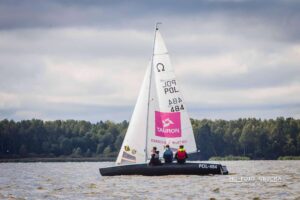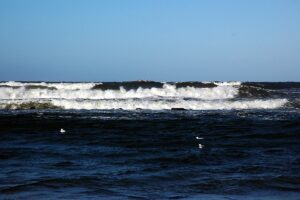According to Mateusz Perowicz, collaborator of BiznesAlert.pl, Poles can make a significant contribution to environmental protection by cleaning the Baltic Sea from wrecks.
Natural environment protection is one of the main topics in the public debate. Climate change prompts the government to take measures to reduce CO2 emissions. Making global warming a major threat to the planet eclipses other, no less dangerous processes that can also have disastrous consequences for the natural environment. There are wrecks of ships sunk during World War II, filled with fuel, conventional weapons, chemical weapons and even nuclear weapons off the coast of the Baltic Sea. With this threat, in contrast to global warming, we can fight effectively.
In recent weeks, temperature records have been noted in Italy, France, Spain, Portugal, the Czech Republic, Croatia and also in Poland. We were also struggling with the lack of water. The German cities of Loehne and Bad Oeynhausen have introduced restrictions on the amount of drinking water. Its consumption was limited to the needs of life, and for excessive use, a fine of EUR 1,000 was imposed. In Poland, water began to be scarce in Skierniewice, and the Institute of Meteorology and Water Management alarmed about all types of drought. Disturbing signals also flow from Masuria. English scientists prove that all Great Masurian Lakes have decreased by five percent in the last ten years. Their surface is smaller. Climate warming has an impact on it. The problem is that we can do little with this whole warming. The „Global Carbon Budget 2017” report prepared by 76 scientists from 57 institutions illustrates emissions from fossil fuel combustion and cement production. In this ranking, Poland is on the 21st place, having emitted 326.6 million tons, which is … 0.9 percent in the world. Even if we completely give up on CO2 emissions overnight, the planet will not feel any relief. However, we can help it in a different way.
About 2,000 ships and ships from various historical epochs may rest on the coast of the Baltic Sea. Wrecks are an invaluable attraction for sports divers, a treat for historians, archaeologists and engineers investigating the fate of marine technology and a deadly threat to the Baltic Sea ecosystem. The radioactive concentration at the site of the sinking of the Soviet nuclear ship Komsomolets was 100,000 times higher than its standard level in saltwater. The measurements were made by a Russian-Norwegian expedition investigating the shipwreck. In turn, scientists from the MARE Foundation and the Maritime Institute in Gdańsk alarmed about a ticking bomb containing one and a half million liters of fuel, which can contaminate a huge area at the Polish seaside every moment. The reason for the whole confusion is the Franken ship, which was the supplier of the German fleet supplying fuel and ammunition for units that operated in the area of the Gulf of Gdansk during the Second World War. It was sunk in April 1945 by Russian planes.
During the conference „Wrecks of the Baltic Sea” organized by the MARE Foundation and the Maritime Institute in Gdańsk, the public was informed that at the bottom of the Baltic Sea there can be up to 100 dangerous wrecks. According to the calculations of dr inż. Hac, several dozen of them can be in the Polish zone of the Baltic Sea only. The Supreme Audit Office is observing the matter, informing that according to various estimates, the Baltic Sea may amount to 50 to even 100,000 tons of chemical weapons and ammunition. It was drowned mainly in the Gotland Deep and the Bornholm Deep. Interest of state institutions is good, but the problem is that so far, no way to stop the threat has been presented. It is also unclear where to get the funds for the purge action. Who should pay for cleaning up the Soviet wreck shot down by the Luftwaffe in the waters assigned to Poland after the end of World War II?
The problem is international, the threat concerns all countries located on the Baltic Sea, as well as all participants of the battles in the Baltic Sea during the WW2. Only coordinated cooperation between the Baltic States can effectively counter this threat. We need an international fund to combat this phenomenon, in which both the countries affected by the problem and the heirs of the regimes responsible for this threat will participate. The greenhouse effect is a phenomenon that we have to face. However, Poland and most of the countries in the region, despite their sincere intentions, will not be able to reduce CO2 emissions enough to effectively help the planet. We can, however, prevent contamination of the Baltic Sea that can occur at any time.








